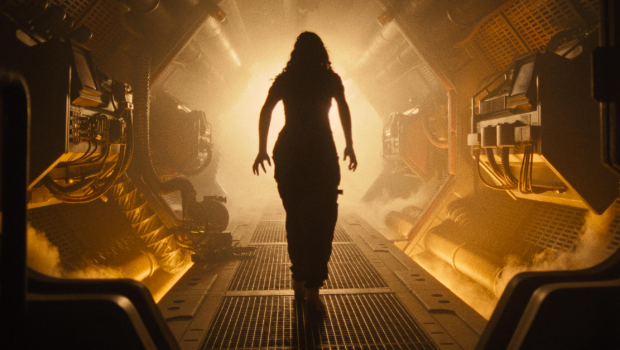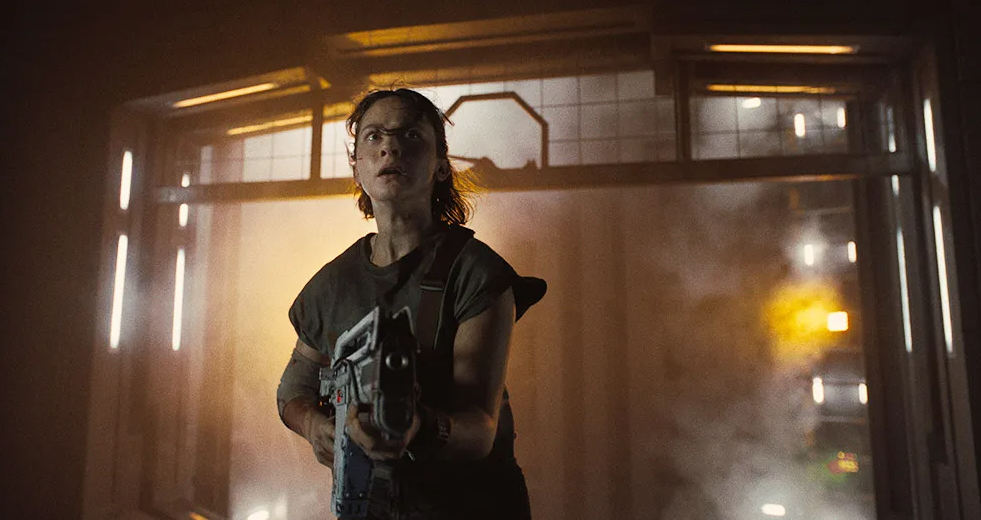Alien: Romulus – Film Review
Reviewed by Harris Dang on the 15th of August 2024
20th Century Studios presents a film by Fede Alvarez
Produced by Ridley Scott, Michael Pruss and Walter Hill
Starring Cailee Spaeny, David Jonsson, Archie Renaux, Isabela Merced, Spike Fearn, and Aileen Wu
Cinematography Galo Olivares
Edited by Jake Roberts
Music by Benjamin Wallfisch
Running Time: 119 minutes
Rating: MA15+
Release Date: the 15th of August 2024
Alien: Romulus tells the story of Rain Carradine (Cailee Spaeny), a space colonist and young orphan who lives with her adopted brother Andy (David Jonsson), who is an android known as a synthetic. They share a paternal bond with each other and they reside on a planet that is almost uninhabitable to the point that there is never any direct sunlight. Looking for a way off the planet and moving to a better place, Rain teams up with her former colleagues at her mining company, including Tyler (Archie Renaux), Kay (Isabella Merced), Bjorn (Spike Fearn), and Navarro (Aileen Wu).
Not wanting to wait for the authorities to give them the permits to leave the planet to get to their destination, Tyler proposes a plan to scavenge an abandoned space station and use it to travel via cryosleep — and Andy is needed for the mission. While the mission itself sounds simple enough, the group begin to realise that their lives will be in grave danger when they discover what is the most dangerous lifeform in the universe.
Romulus is the seventh entry in the Alien franchise (ninth, if one counts the Alien vs. Predator films) as well as the latest film from writer/director Fede Alvarez. It is also the first film in the franchise that is made under the new acquisition of 21st Century Fox by Disney. Alvarez is best known for his efforts in the horror genre, namely his Evil Dead remake (2013) and Don’t Breathe (2016). All the Alien movies from the 1979 original to Alien: Covenant (2017) were driven by compelling central ideas and its distinct genre paths. The original film by Ridley Scott is essentially a contained thriller while the sequel Aliens by James Cameron is an action horror flick. The unfairly maligned third film Alien 3 (1992) by David Fincher was a religious prison movie whereas the underrated Alien: Resurrection (1997) by Jean-Pierre Jeunet was a dark, macabre comedy. Ridley Scott’s recent entries, Prometheus (2012) and Alien: Covenant, were epic mythos told on a huge scale.
All the films had their own thematic backbone that ranged from government corruption, fear in lack of understanding, motherhood, existentialism, misanthropy, and creationism. These thematic ideas elevated the films from mere genre pieces into feats of great science-fiction storytelling. Which leads to Romulus, a film that scales back from the epic scope from the previous films and back into the contained feel of the 1979 original. But does Alvarez, like his prior filmmakers, provide a compelling idea or distinct feel that makes Romulus stand on its own two feet? Sadly, Romulus falls into the trap that most long-awaited sequels do nowadays – catering to audiences by reliving the past through callbacks with no interesting ideas of its own to back them up.
As for the positives, David Jonsson gives a great performance as Andy. His enigmatic presence is compelling as Jonsson is able to navigate his way into becoming the role of the protector, patriarch and possible opposer with emotional dexterity. Secondly, his bond with Spaeny provides the one emotional throughline that is mildly diverting as they have a genial bond. Thirdly, the production values (aided by cinematographer Galo Olivares) look fantastic. The emphasis on tactile environments and practical effects lend the film a grounded quality that makes the film immersive from frame one. Lastly, some of the set-pieces are effective in their creativity, particularly with the use of anti-gravity.
It is just a shame it all amounts to a film that is creatively bereft, nauseatingly derivative, and insultingly pandering for the sake of fan service. Whether it would be rehashing a visual reference, an iconic one-liner (that makes no sense given the character that says it), a major musical cue (in case the audience did not get the visual reference), a returning character (which results in an unforgivable turn of digital grave robbing) or a story beat – having these references becoming prevalent (particularly in the final act) dulls any potential pathos as the film becomes nothing more than a feature-length advertisement for how great the franchise is.
Even if the film had the fan service taken out of it, Romulus would still not have worked on its own. There is no core idea behind the storytelling that makes narrative come together and take flight. The characters are thinly sketched to the point that they are almost do not qualify as archetypes. The screenplay by Alvarez and regular collaborator Rodo Sayagues does the actors no favours in terms of character development or identifiable emotions to grab hold of and the actors (barring Jonsson) do not have the gravitas to bring their characters to life. Even with the character types that were in the 1979 film, the interplay with the characters felt genuine. Whereas in Romulus, a lot of the dialogue feels like telegraphing (both emotionally and narratively), which makes the storytelling predictable.
Overall, Alien: Romulus is another flagrant example of a franchise entry that is overcluttered with ties to its past. It is too underdeveloped to have its own reason to exist.
Summary: It is a shame it all amounts to a film that is creatively bereft, nauseatingly derivative, and insultingly pandering for the sake of fan service.








